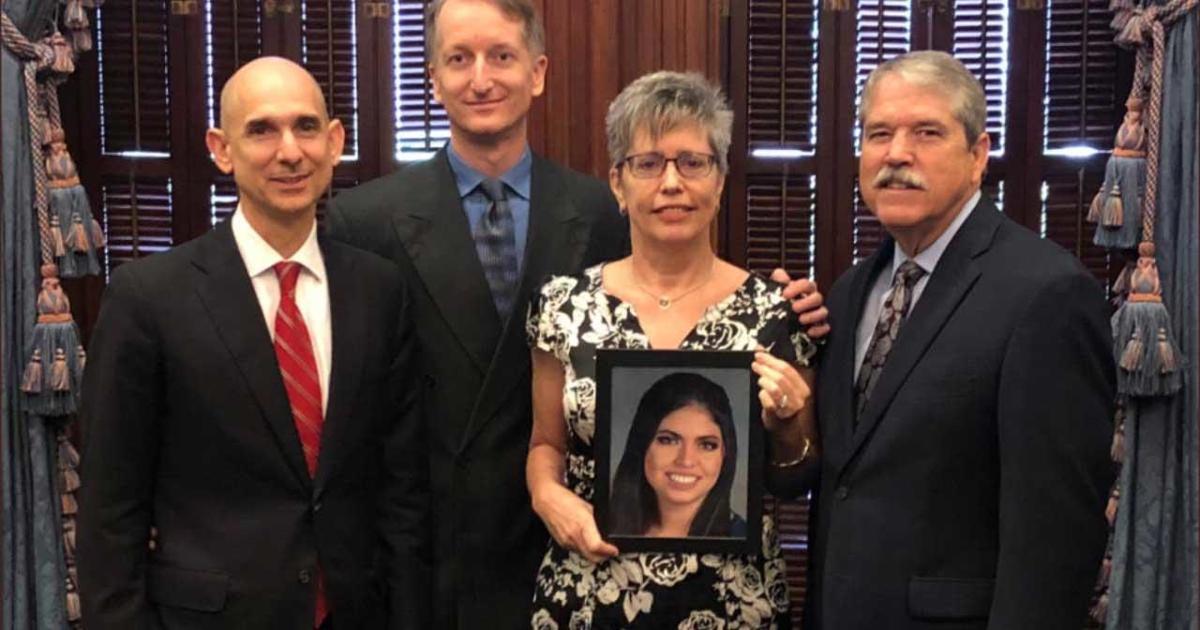When 19-year-old Cayley Mandadi didn’t show up to a weekly sorority meeting on Oct. 29, 2017, her friends at Trinity University in San Antonio feared the worst. They tried calling her cell phone and sending messages on social media but couldn’t get confirmation that the college cheerleader was OK.
“We were very panicked. Like, frenzied. We were calling everybody we knew,” Trinity student Ariana Conway said.
Mandadi’s friends said her boyfriend Mark Howerton was the only person who ever responded to them. When Morgan Sampson made a FaceTime call to Mandadi’s phone, Howerton answered.
“He said she can’t talk right now,” Sampson said.
Cayley Mandadi
Taylor Clement
Feeling the situation had escalated, Mandadi’s friends reached out to the San Antonio Police Department for help.
“We went to a police station and tried to file a police report. But they wouldn’t let us do that,” Conway said. “We also tried to file a wellness check, I believe. But that wasn’t an option, either.”‘
At the time of Mandadi’s disappearance, there was nothing in place for law enforcement to broadcast information about missing adults ages 18-64 in Texas.
Just 19 years old, Mandadi did not qualify for the Amber Alert program, a nationwide missing children alert system that sets off notifications for endangered persons from infancy to age 17. And the only other alert systems in Texas at the time were for the mentally disabled or senior adults, ages 65 or older.
Mandadi’s mother, Alison Steele, didn’t find out her daughter was missing until she got a call from Luling, Texas, authorities, who told her Cayley was in critical condition at a rural hospital.
Tragically, Mandadi was declared brain dead on Oct. 30, 2017 and taken off life support the next day, just 48 hours after her friends had desperately tried to report her missing. Her boyfriend Mark Howerton was later charged with kidnapping, sexual assault, and murder. He pleaded not guilty, and his defense argues that Cayley’s fatal injuries were caused by the aggressive lifesaving measures the medical team put her through. Howerton’s case is still pending.
Steele turned her grief into action and vowed that her only daughter’s death wouldn’t be in vain. Steele, an environmental industry professional for 27 years, put her career on hold to dedicate herself to creating a new law in her daughter’s memory.
Alison Steele was able to get the CLEAR Alert Bill passed. Now in the state of Texas when someone between the ages of 18-64 goes missing, an emergency text will go out to the community. Steele wants “Cayley’s story to be used to help other people.”
Alison Steele
In September 2019, less than two years after Mandadi’s death, the Texas Legislature approved the Coordinated Law Enforcement Adult Response, or CLEAR Alert.
Now, when someone reports an adult ages 18 to 64 missing in Texas, authorities issue a CLEAR Alert through the state’s Emergency Broadcast system with the endangered person’s information and last known whereabouts.
“The CLEAR Alert is a game changer. It’s a paradigm shift in terms of our ability to find missing persons and to intervene in active situations that could turn fatal,” Steele said. “We couldn’t save Cayley. But maybe we can save the next one.”
The CLEAR name has a double meaning, Steele said, representing Cayley Mandadi, D’Lisa Kelley, Erin Castro, Ashanti Billie, and the Rest of victims who died before the law existed.
“Symbolically, it actually stands for some of the victims, who may have been saved if there had been an alert available at the time,” Steele said.
Although the CLEAR Alert went into effect in 2019, Steele said her job is far from finished. To support the legislation, Steele formed the nonprofit Cayley’s Calling and travels around Texas giving presentations to law enforcement agencies and other groups about best practices for implementing the alert.
She hopes one day it will become a nationwide law, just as the Amber Alert, which also originated in Texas, did.
“I don’t want to be the mom who made the law, and made the news and didn’t make the grade,” Steele said. “I’m committed to actually pushing out and developing this program.”
To learn more about the CLEAR Alert and how to request assistance for a missing adult in Texas, visit the Texas Department of Public Safety website.
